Professor Maria João Maciel Jorge and alumnus Vander Tavares have co-edited a new book, Reconstructions of Canadian Identity, highlighting the lived experiences of marginalized Canadians
Maria João Maciel Jorge and Vander Tavares

Internal YFile sub-tag

Professor Maria João Maciel Jorge and alumnus Vander Tavares have co-edited a new book, Reconstructions of Canadian Identity, highlighting the lived experiences of marginalized Canadians
Shakeup at top of Hamilton’s public institutions leads to loss of two leaders at St. Joe’s
York University Professor Richard Leblanc was quoted in the Toronto Star April 12.
Wellness kits offered to Indigenous university students for exam stress and anxiety
York University Professor Brock Pitawanakwat was quoted in CBC News April 12.
Two of Brampton’s highest paid employees don’t even work there
York University Professor Zachary Spicer was quoted on cbc.ca April 12.
A popular alien-hunting technique is increasingly in doubt
York University Professor Sarah Rugheimer was quoted in Technology Mag April 14.
The best LGBTQ plus universities in Canada 2024
York University was mentioned in University Magazine April 13.
See more ways York University is making headlines at News @ York.
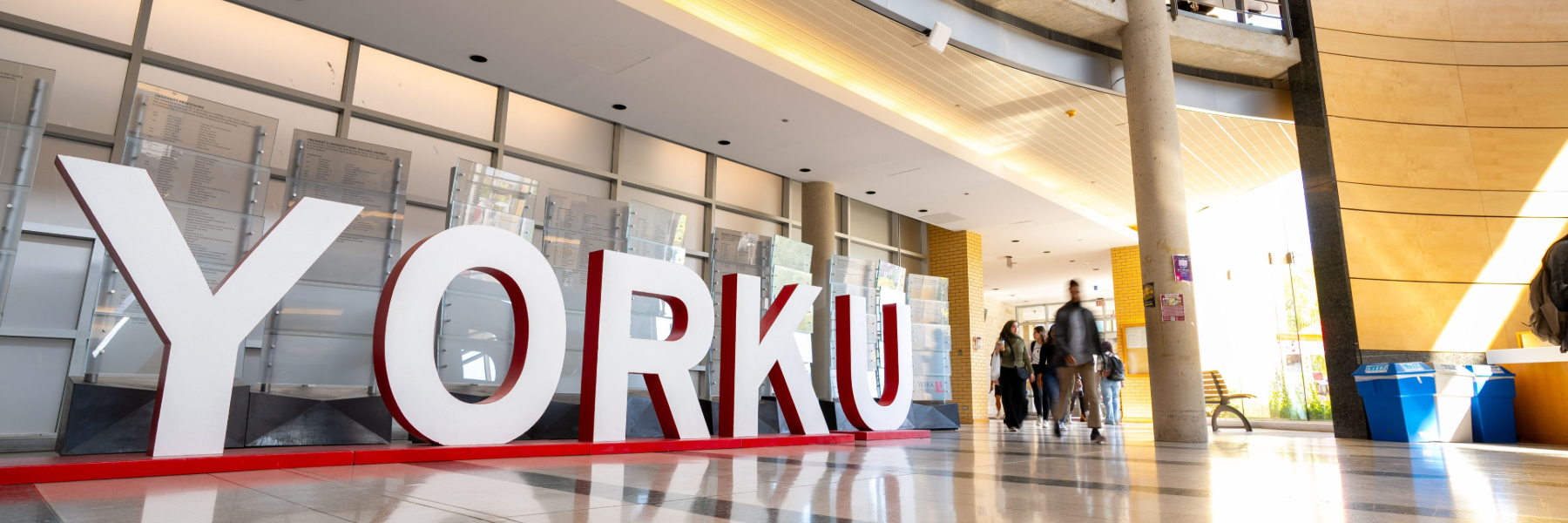
Connection Grants support events, workshops, and outreach activities that often lead to longer-term research projects and enable scholarly exchanges with academic and non-academic partners, and collaboration between the public, private and not-for-profit sectors.
This year, Adrian Shubert, a professor emeritus in the Department of History, received a Connection Grant of $25,446 to pursue phase two of his project “Spanish Civil War: A Virtual Museum – adding new galleries and content, extending the audience and developing resources for educators.”
Shubert’s outreach project’s overarching goal is to further extend knowledge exchange and dissemination about one of the most controversial and written-about events of the 20th century. The project will build on the core research team’s prior achievement of the permanent Spanish Civil War: A Virtual Museum, the construction of which was aided by SSHRC support. Since opening in September 2022, the virtual museum has been visited by 66,000 people from more than 130 countries.
“We greatly value the work of knowledge mobilization in our Faculty, and these successes not only advance our research agendas, they widen the audiences for our work and grow our reputation for research excellence,” said Ravi de Costa, associate dean of research and graduate studies, LA&PS.
In addition to Shubert, several York professors also received Insight Development Grants, which are awarded to emerging and established scholars in the social sciences and humanities to work on research projects of two to five years.
With 11 out of the 18 successful projects, LA&PS faculty saw a 61.1 per cent success rate for the 2023 Insight Development Grants. The initiatives supported by the program will help LA&PS researchers advance knowledge in critical areas of artificial intelligence, feminism, environmental humanities and many other fields.
“Support for research in its early stages is vital for scholars at all stages of their careers,” said David Cuff, director of strategic research and partnerships, LA&PS. “This funding will help our new colleagues establish themselves and give established colleagues scope to explore new avenues of discovery.”
The 11 faculty, and their projects, are:
Duygu Biricik Gulseren, School of Human Resources Management
Inconsistent Leadership: Scale Development and Measurement
$69,415
Ann Marie Murnaghan, Department of Humanities
Old poles and new stories: archival knowledges and oral histories of C’idimsggin’is and Kurt Seligmann
$70,521
Rianka Singh, Department of Communication & Media Studies
Platform Feminism
$53,363
Hannah Johnston, School of Human Resources Management
Regulating algorithmic management in standard employment: A comparison of legislative and industrial relations approaches
$71,209
Matthew Leisinger, Department of Philosophy
Cudworth’s conscious self
$36,492
Simone Bohn, Department of Politics
When Reproductive Self-Determination Remains Restricted. Women’s Strategies of Resistance in Brazil
$74,518
Ibtissem Knouzi, Department of Languages, Literatures & Linguistics
Critical Transitions in the Literacy Development of International Multilingual Students in English-medium Universities: A Longitudinal Mixed-Methods Study
$63,000
Zhixiang Liang, School of Administrative Studies
The Impact of Institutional Systems on Foreign Direct Investment: A Multilevel Study of Chinese Multinational Enterprises
$63,393
Andrew Sarta, School of Administrative Studies
Imagining Augmentation Possibilities and How Organizations Adapt to the Emergence of Artificial Intelligence
$55,750
Jean-Thomas Tremblay, Department of Humanities
Eco-subtraction: downsizing the environmental humanities
$47,341
Yishu Zeng, Department of Economics
The Design of Information Disclosure Policy in Strategic Interaction
$57,238

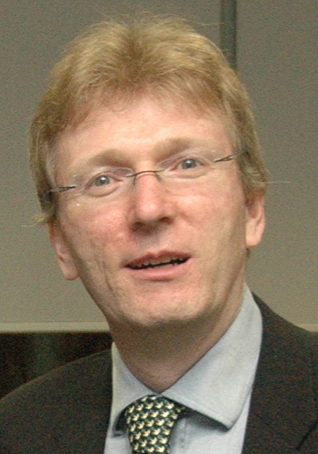
Martel and Gagné proposed the exhibit based on their surprising research findings of an active pre-Second World War wine industry that spanned the province, from Windsor to Sudbury.
“When I conduct research on an issue, there are always some unexpected discoveries,” explains Martel. “I was surprised to discover the number of wineries and wine sellers in urban areas, especially in Toronto, and the multicultural ethnic origins of wine makers and sellers, since most of them came from Britain, France, Italy and the United States.”
The exhibit shows how European settlers struggled to use Indigenous-cultivated grape varietals to make European-style wines. It examines the background of various figures in the industry, including farmers seeking wealth and international acclaim, but also Jewish and Italian migrants and women who made wine for domestic consumption. It also considers the impact of prohibition and other headwinds that ultimately delayed the industry’s flourishing until the 1990s.
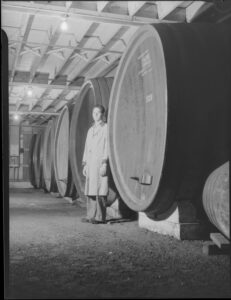
“As we continued our research, we expected to find a landscape of grape growers and vintners in competition – each vying for their share of the Canadian market,” says Gagné. “Instead, we found a story of co-operation and unity among the multicultural wine makers who dotted the 19th-century Canadian landscape.”
Among their many surprising discoveries, the researchers learned that early Canadian winemakers would share grape cultivation, harvesting and hybridization secrets through publications like Canadian Agriculturist. This collaborative spirit, Gagné explains, aimed to overcome the prevailing belief that Canada’s climate wasn’t suitable for winemaking.
“They sought to convince both the government and the public to embrace Canadian wines,” he says. “While ultimately stymied by the rise of temperance movements and prohibition, their efforts revealed an industry defined by shared knowledge – and, often, even shared vine cuttings – to prove to the world that Canada was home to unique and delicious wine.”
In support of the online exhibit, the Archives of Ontario has also prepared a display of archival records and historical artifacts related to Ontario’s wine history that can viewed until fall when visiting the Archives in person at 134 Ian MacDonald Boulevard, next to the Kaneff Tower on York’s Keele Campus. The Archives is open to the public from 8:30 a.m. to 5 p.m. every weekday.
To view the online exhibit, visit Wine Making in Ontario (or La fabrication du vin en Ontario for the French version).
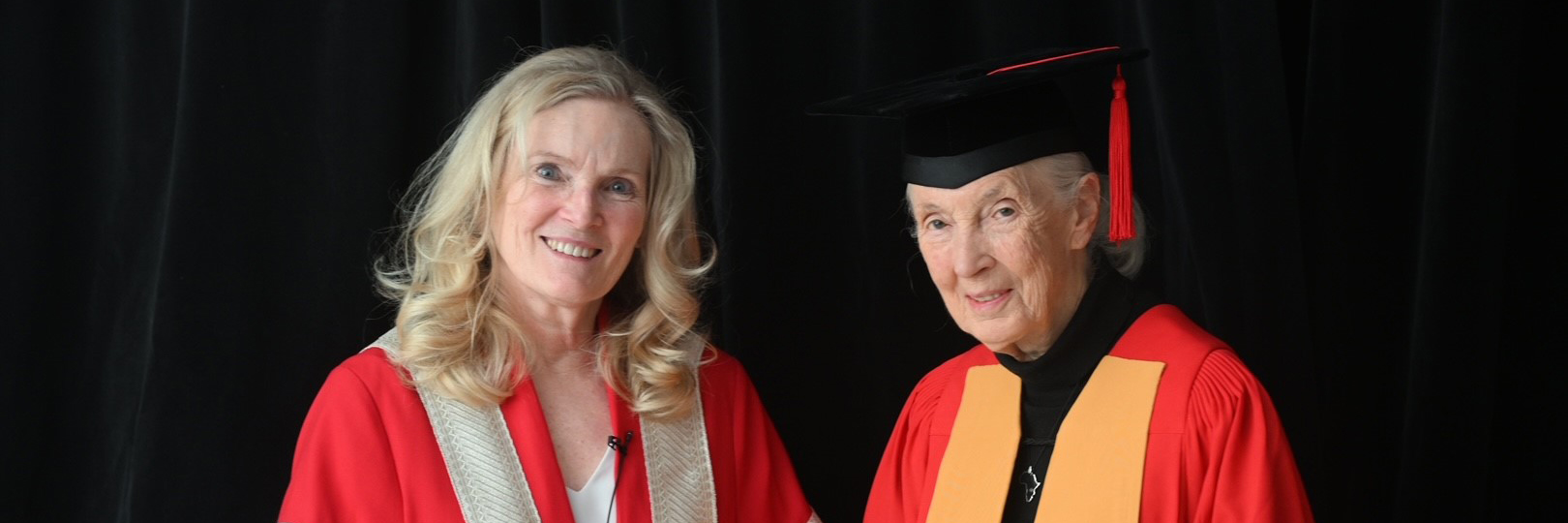
The following is President and Vice-Chancellor Rhonda Lenton’s address at the Honorary Degree Convocation Ceremony in April 2024:
Dear faculty, staff, guests and to our students in the audience today, bonjour and boozhoo.
I am delighted to welcome all of you to this special celebration in honour of our exceptional honorary degree recipient, Dr. Jane Goodall.
Science paints a bleak picture of our future.
Failure to respond to the damaging effects of climate change is already evident in the loss of biodiversity, environmental degradation, increased risk to water and food security, intensifying suffering and loss of life of humans and animals, not to mention magnifying political conflicts and social inequality around the world.
The One Health approach acknowledges that humans, animals and the environment are interconnected, and that in order to advance one, we must fight for the health of all three.
We are at an inflection point: will we take individual and collective action and work together to identify and develop solutions that will ensure our planetary well-being? Or will we be complacent or even deny the evidence affecting us all?
Looking toward the people we have on stage and in the audience, we know that we have the talent, the diversity of ideas and the commitment to shape the actions that need to be taken.
Like many of you, I have long been inspired by Dr. Goodall’s legacy.
Throughout her life, Jane Goodall has conducted groundbreaking research, advanced conservation and environmental stewardship, and inspired advocacy for our planet and all its inhabitants.
Jane, it is an absolute honour to have you here with us today to recognize the remarkable impact you have made across the world. I know I speak on behalf of all of York when I say that your achievements are an inspiration to us all.
Thank you for all that you have done and continue to do, and congratulations on this very well-deserved recognition.
At York University, we recognize the importance of convening people and ideas for meaningful action.
Since its inception, York has been a progressive, research-intensive University committed to enhancing the well-being of the communities we serve by supporting research excellence, interdisciplinary knowledge translation and collaborative partnerships that drive positive change, both locally and globally.
Advancing sustainability is a goal that underscores everything we do, which is why our University Academic Plan includes an institutional challenge to strengthen our contributions to the United Nations’ Sustainable Development Goals (UN SDGs).
Our impact is well noted – we have been recognized as a global leader for five consecutive years in the Times Higher Education Impact Rankings, where we currently rank in the world’s top 40 for our impact on the SDGs.
Each of the Faculties represented here today – Science, Health and the Lassonde School of Engineering – have played a critical role in elevating our sustainability leadership with cutting-edge initiatives such as:
At the institutional level, we have announced ambitious goals to achieve net zero by 2040 or sooner. And we are well positioned to meet these aspirations through our various decarbonization initiatives.
For example, through a recent partnership with Noventa Energy Partners, the York community will leverage leading technology to convert wastewater into thermal energy, an initiative that could see Glendon become the first net-zero campus in Canada.
We continue to move the dial on education, research and partnerships across our campuses – from Toronto to Costa Rica to India – to support the SDGs, but each and every one of us must do more to support global co-operation that translates ideas, research and partnerships into positive change. There is, perhaps, nothing more important than this endeavour. For people like Dr. Goodall, it has become a hallmark of her life’s work – and it is incumbent upon us to carry this forward.
As our talented faculty, staff, contract instructors, alumni, students, and honorary doctorates have proven time and time again, individual actions matter, and by fostering dialogue and collective action, we can build a brighter, more sustainable future for all.
Jane, congratulations once again, and I look forward to hearing more from you shortly.
Thank you all once again for joining us today and for being part of this very special occasion.
Merci. Miigwetch.

The initiative – a partnership between YSpace, an entrepreneurship and innovation hub, and the two towns – was launched in 2021 to provide entrepreneurial resources to the local business community. Those resources include mentorship, access to networks and co-working space for collaboration – many of them tailored to address needs specific to the area.
A chief aim of the initiative is to remove barriers to accessing entrepreneurship and business acceleration for rural communities , whether those involved are startups or existing enterprises. A dedicated space has offered virtual and in-person opportunities as well as access to computers, internet, video conferencing solutions, photography tools for e-commerce and online content creation, collaboration spaces, programming support and business community resources.
At the time of the launch York’s Vice-President of Research and Innovation Amir Asif, said, “We look forward to further strengthening this partnership and witnessing the ideas that participating entrepreneurs bring to life – contributing to the region’s knowledge-based economy and creating positive change in their communities and beyond.”

David Kwok, director of entrepreneurship and innovation at YSpace, says in the past few years, they’ve made great progress towards that mission. “Since opening our doors in 2021, we have supported over 700 individuals in Georgina and East Gwillimbury through educational workshops and specialized programming focusing on pivotal areas such as business plan development and digital marketing.”
Now, with the new funding from RED, it can continue to do so.
The RED program looks to support projects that diversify rural economies, retain skilled workers and create jobs in local communities. It also aspires to help better position rural communities to attract or retain investment, and enhance economic growth, while diversifying local economies.
With that in mind, YSpace plans to further enhance its entrepreneurial support service. “This new funding will enable us to continue our work and launch a new mentorship program that is customized to the unique needs of local business owners,” says Kwok. The program will see an expansion of one-on-one mentorship opportunities for aspiring and established entrepreneurs in the region.
The hub will pursue recruiting experienced mentors from diverse industries and backgrounds, ensuring that entrepreneurs receive tailored guidance and expertise relevant to their specific business needs. Through those personalized mentorship relationships, the goal is to empower entrepreneurs to overcome obstacles, make informed decisions and achieve their business goals, ultimately contributing to the economic development and prosperity of the community.
In that way, YSpace continues to live up to what Rhonda Lenton, president and vice-chancellor of the University, said when the Northern York Region Hub was announced: “York University is committed to leveraging the success of YSpace’s entrepreneurship programs and make available customized resources to support economic growth and prosperity for the Towns of Georgina and East Gwillimbury. We look forward to continuing this relationship, and building greater access to entrepreneurship for all businesses in the region.”

The town hall was presented by York University President and Vice-Chancellor Rhonda Lenton. She and other members of the University leadership team were on hand to answer questions from the more than 900 people in attendance.
The full video of the town hall is now available to the York U community.
Community members can also find answers to questions submitted to the town hall on the Labour Disruption website’s FAQ.
Additional questions can be sent to communityconversations@yorku.ca.

Professor Emeritus Gerard Naddaf’s new book, Making Sense of Myth: Conversations with Luc Brisson, explores the importance of myths as creators of the self and group identity throughout history.
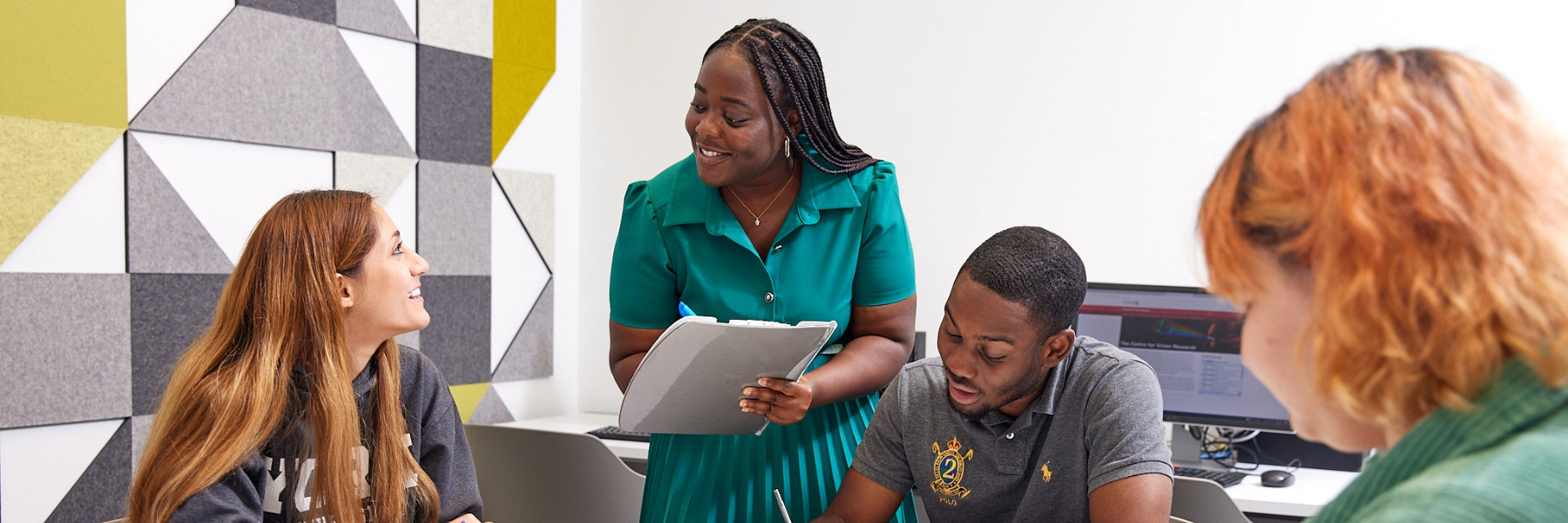
The award was created by former students of Professor Emeritus Ian Greene – from York’s School of Public Policy & Administration – in recognition of his outstanding drive and efforts to make learning a unique experience. The award is overseen and presented by the Student Council of Liberal Arts & Professional Studies (SCOLAPS).
Award nominations are open to LA&PS students only, ensuring that truly outstanding professors and TAs receive the recognition they deserve. Each student is eligible to nominate one professor and one TA of their choice. Nominees do not need to have taught the students this academic year, but they must be current, practising members of the University’s academic staff.
Recipients are selected by a five-person adjudication committee made up entirely of students. The committee is formed by the award director, a student position elected within the SCOLAPS executive.
To submit a nomination, students can fill out either the online nomination form or the PDF nomination form.
For more information, email Hale Mahon at hmahon@my.yorku.ca

Work is undertaken using accepted practices and approved materials by Professional PCO Services, which holds an Eco Green Ergonomic Extermination certificate from the Ministry of the Environment. A work permit has been submitted and approved by York University’s Health, Safety & Employee Well-Being office.
Monitoring and treatment of component applications will be carried out in the Food Services locations listed below:
| Location | Campus | Building Name |
| Glendon Campus Marché Cafeteria | Glendon Campus | York Hall |
| Glendon Campus Tim Hortons | Glendon Campus | York Hall, A Wing |
| Bergeron Market | Keele Campus | Bergeron Centre for Engineering Excellence |
| Central Square Cafeteria | Keele Campus | Central Square |
| Central Square Tim Hortons | Keele Campus | Central Square |
| Central Square Booster Juice | Keele Campus | Central Square |
| Central Square Pizza Pizza | Keele Campus | Central Square |
| Central Square Starbucks | Keele Campus | Central Square |
| Central Square Subway | Keele Campus | Central Square |
| Centre for Film & Theatre Starbucks | Keele Campus | Centre for Film & Theatre |
| Dahdaleh Cafeteria | Keele Campus | Victor Phillip Dahdaleh Building |
| Dahdaleh Tim Hortons | Keele Campus | Victor Phillip Dahdaleh Building |
| Lassonde Palgong Tea | Keele Campus | Lassonde Building |
| Osgoode Hall Bistro | Keele Campus | Ignat Kaneff Building, Osgooge Hall |
| Stong College Orange Snail | Keele Campus | Stong College |
| Stong College Cafeteria | Keele Campus | Stong College |
| William Small Centre Tim Hortons | Keele Campus | William Small Centre |
| Winters College Country Style | Keele Campus | Winters College |
| Winters College Cafeteria | Keele Campus | Winters College |
| Grad Lounge | Keele Campus | Ross Building |
| Pod | Keele Campus | Curtis Lecture Halls |
For further information, contact John Leva, manager of grounds, fleet and waste management, Facilities Services, at jleva@yorku.ca; or Tom Watt, director of food services, Ancillary Services, at watttm@yorku.ca.